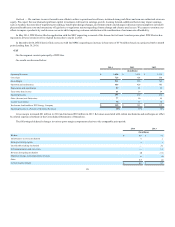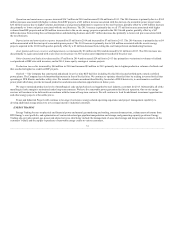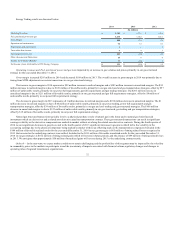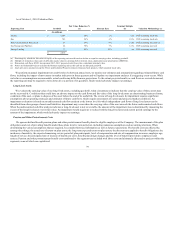DTE Energy 2014 Annual Report Download - page 39
Download and view the complete annual report
Please find page 39 of the 2014 DTE Energy annual report below. You can navigate through the pages in the report by either clicking on the pages listed below, or by using the keyword search tool below to find specific information within the annual report.
Credit ratings are intended to provide banks and capital market participants with a framework for comparing the credit quality of securities and are not
a recommendation to buy, sell or hold securities. DTE Energy’s credit ratings affect our cost of capital and other terms of financing as well as our ability to
access the credit and commercial paper markets. Management believes that our current credit ratings provide sufficient access to the capital markets.
However, disruptions in the banking and capital markets not specifically related to us may affect our ability to access these funding sources or cause an
increase in the return required by investors.
As part of the normal course of business, DTE Electric, DTE Gas and various non-utility subsidiaries of the Company routinely enter into physical or
financially settled contracts for the purchase and sale of electricity, natural gas, coal, capacity, storage and other energy-related products and services. Certain
of these contracts contain provisions which allow the counterparties to request that the Company post cash or letters of credit in the event that the senior
unsecured debt rating of DTE Energy is downgraded below investment grade. Certain of these contracts for DTE Electric and DTE Gas contain similar
provisions in the event that the senior unsecured debt rating of the particular utility is downgraded below investment grade. The amount of such collateral
which could be requested fluctuates based upon commodity prices and the provisions and maturities of the underlying transactions and could be substantial.
Also, upon a downgrade below investment grade, we could have restricted access to the commercial paper market and if DTE Energy is downgraded below
investment grade our non-utility businesses, especially the Energy Trading and Power and Industrial Projects segments, could be required to restrict
operations due to a lack of available liquidity. A downgrade below investment grade could potentially increase the borrowing costs of DTE Energy and its
subsidiaries and may limit access to the capital markets. The impact of a downgrade will not affect our ability to comply with our existing debt covenants.
While we currently do not anticipate such a downgrade, we cannot predict the outcome of current or future credit rating agency reviews.
In January 2014, based on a favorable view of the U.S. regulatory environment, Moody's upgraded DTE Energy's unsecured debt rating from 'Baa1' to 'A3'
and upgraded the secured debt rating of DTE Electric and DTE Gas from 'A1' to 'Aa3'.
The preparation of financial statements in conformity with generally accepted accounting principles require that management apply accounting
policies and make estimates and assumptions that affect results of operations and the amounts of assets and liabilities reported in the financial statements.
Management believes that the areas described below require significant judgment in the application of accounting policy or in making estimates and
assumptions in matters that are inherently uncertain and that may change in subsequent periods. Additional discussion of these accounting policies can be
found in the Notes to Consolidated Financial Statements in Item 8 of this Report.
A significant portion of our business is subject to regulation. This results in differences in the application of generally accepted accounting principles
between regulated and non-regulated businesses. DTE Electric and DTE Gas are required to record regulatory assets and liabilities for certain transactions that
would have been treated as revenue or expense in non-regulated businesses. Future regulatory changes or changes in the competitive environment could
result in the discontinuance of this accounting treatment for regulatory assets and liabilities for some or all of our businesses. Management believes that
currently available facts support the continued use of regulatory assets and liabilities and that all regulatory assets and liabilities are recoverable or
refundable in the current rate environment.
See Note 8 to the Consolidated Financial Statements in Item 8 of this Report, "Regulatory Matters".
Derivatives are generally recorded at fair value and shown as Derivative assets or liabilities. Changes in the fair value of the derivative instruments are
recognized in earnings in the period of change, unless the derivative meets certain defined conditions and qualifies as an effective hedge. The normal
purchases and normal sales exception requires, among other things, physical delivery in quantities expected to be used or sold over a reasonable period in the
normal course of business. Contracts that are designated as normal purchases and normal sales are not recorded at fair value. Substantially all of the
commodity contracts entered into by DTE Electric and DTE Gas meet the criteria specified for this exception.
37
























